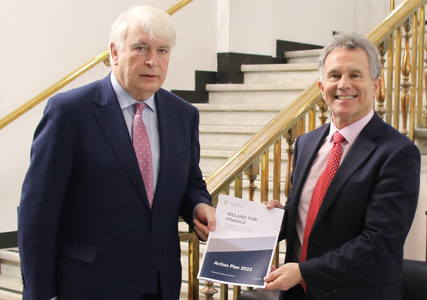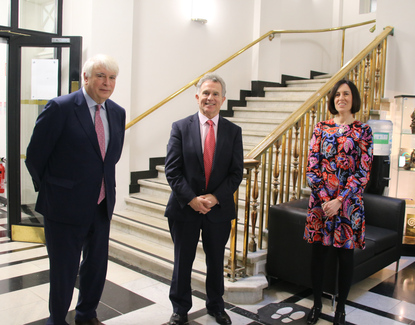| Mid term review of the ‘Ireland for Finance’ strategy for the international financial services sector to be published |
|
The Government has invited input from all parties to provide inputs for a review of its “Ireland for Finance” strategy for the development of Ireland’s international financial services sector.
Speaking to Finance Dublin in an interview, on the launch of the Action Plan 2002 for the medium term strategy, originally covering the period to 2025, for Minister for State Sean Fleming said “we’re now commencing a review of our entire strategy that commenced in 2019. Minister Donohoe and I feel it very appropriate because everything has evolved. And we want to look beyond where we were in 2019 when that plan was drafted”.
The 2022 Action Plan contains a number of new emphases, for example an aim of ‘Financial Inclusion’, which are set to be elaborated upon in what Minister Fleming described as a ‘mid term review’. |
Following the publication of the mid term review of the strategy in its IFS Action Plan 2022 , he said that it will be “all heads down to work on an entire review of our strategy given that we are half way through, and maybe take the strategy not just to 2025, which is not much more than two years away when you think of it, but maybe on for a further period.
“We will have a major build on what we’ve achieved. There will be significant changes in emphasis, like the things I’ve mentioned, the Sustainable Finance, and the Fintech elements, which always been there, and which will be in the years to come”.
The Action Plan document says that employment in international financial services grew by 5.6 per cent in net terms, to a new record of 52,800 jobs, figures contained in the 'Ireland for Finance' Action Plan for 2022, published by the Department of Finance.
These figures are derived from annually compiled employment surveys conducted by the state enterprise agencies, IDA Ireland and Enterprise Ireland, and which, since the 1970s, have been used to monitor net and gross job creation in the manufacturing and services sectors. The figures do not include professional services provided in the IFS sphere, and thus would tend to understate the total employment levels that could be attributed to International Financial Services activity. | | (L-R) Ken O'Brien, editor of Finance Dublin, with Minister of State at the Department of Finance, Sean Fleming TD. |
Minister Fleming said this satisfactory result reflected an overall growth pattern that was overcoming tech-linked job losses in the sector and was resulting in net employment increases that were resulting in higher remunerated employment that was widely distributed across the regions of the state.
He said that the figures represented a satisfactory achievement in line with the original targets envisaged in the Ireland for Finance Strategy which covers a five year span from 2019 to 2025. Job numbers in International Financial Services estimated in the annual employment surveys conducted by the enterprise agencies show that net employment grew by 2,800 in the 12 months ending in December 2021, compared with the total of 50,000 at the end of 2020. "This is a testimony to the importance of the sector to our economy", the Minister said.
The IFS Action Plan 2022, published earlier this month has been revised and streamlined, focusing on five major themes: 1) 'Sustainable Finance' (an area that is being prioritised, with emphasis particularly, the Minister said, on developing the substantial energy resources off Ireland's Western and Southern coasts; 2) Fintech and digital Finance, to include ‘insuretech’ and ‘instech’, 3) Diversity and Talent, with detailed mention of numerous initiatives on the educational and inclusivity fronts; 4) Regionalisation and Promotion, and Theme 5) 'Operating Environment'.
The Report also features a number of new elements, which are likely to feature more prominently in the mid term review of the strategy that will appear in mid year.
This includes a new concept, floated in the action Plan of “Financial Inclusion”:
“It is a Government priority to promote financial inclusion as consumer habits drive change in traditional banking models. True financial inclusion is not just about whether or not someone has access to an ATM; it is also about whether they are able to use the full range of financial services and become part of the economic fabric of society”.
This aim, included in the Fintech & Digital Finance section of the report, takes a consumer perspective, and signals a change in emphasis evident in the 2022 Action Plan report, an emphasis that is also seen in an upgrading in the emphasis on domestic FS entrepreneurial enterprise, to complement the historically successful IDA Ireland-led efforts to attract leading global IFS institutions to Ireland.
Fintech & job losses
The Minister referred to the inevitable job losses in domestic banking that would accompany Ulster Bank’s withdrawal from the Irish market, suggesting that IFS employments could prove alternative employment options within the FS sector.
Department of Finance officials are estimating, in interpreting the figures, (which do not explicitly measure net and gross job losses in the sector) that overall gross employment growth has been running at approximately 9 per cent, in the past year or two, while with a fallout of 3 per cent from job erosion mainly due to fintech, and concentrated in the domestic banking sector, leaving the overall current net employment growth figure of 5%+. | | (L-R) Ken O'Brien, editor of Finance Dublin, with Minister of State at the Department of Finance, Sean Fleming TD, and Karen Cullen, Head of the International Financial Services Unit of the Department of Finance, which has responsibility for producing the draft documentation for the Ireland for Finance strategy Action Plans and reviews. |
Housing
Also, in response to a question on housing policy, specifically on developing the Shared Equity scheme to facilitate access to housing, he did not rule out the possibility in the future of extending the scope of that scheme to applicants rather than just first time buyers, to whom it is currently restricted.
‘We did have the shared ownership scheme, I remember personally people in my constituency availed of that its not a new concept in Ireland at all, its gone off the boil, its use has now been reinstated.
“Those things are subject to change nothing is set in concrete. The emphasis all along for Government was ‘we needed to increase our housing stock, we needed new build; so giving financial incentives to people to move on from their first house to their second house wasn’t adding to the housing stock’.
The Minister said that the emphasis had to remain on the supply side, ‘to promote new builds’.
“The first second and third priority was to increase the housing stock, so it all concentrated on new builds, so that has been the emphasis. There’s the great scheme at the moment where people can get tax back up to €30,000, for instance . All of those schemes are based on new builds, not just people moving house. That doesn’t solve any problem. But in due course things like that (extending the Shared Equity scheme to others rather than than first time buyers) can be looked at”.
Specifically referencing the five overarching themes of the Action Plan 2022, the Minister reiterated the Government’s commitment to supporting the drive for sustainable finance.
As part of that, he expressed a hope that spin off manufacture of the engineering equipment required to develop renewables in the offshore areas, such as platforms and turbines would take place in Ireland as the plan developed, in the long term, which he put at 35 years. “In a second spin off if we move early to have them produced here onshore rather than imported from half way round the globe”.
The Minister also highlighted the Talent and Diversity themes in the Plan, stating that the Charter for Women, to promote the inclusion of women, was a priority that would see immediate crystallation.
He also emphasised other aspects of diversity and inclusion objectives, including Financial Inclusion, for people disadvantaged by disruption at the consumer level, as well as other aspects.
The Action Plan summarises this newly articulated objective as follows: “It is a Government priority to promote financial inclusion as consumer habits drive change in traditional banking models. True financial inclusion is not just about whether or not someone has access to an ATM; it is also about whether they are able to use the full range of financial services and become part of the economic fabric of society.”
“The European Union’s ‘2030 Digital Compass’, published in March 2021, sets as its aim: ‘to pursue digital policies that empower people and businesses to seize a human centred, sustainable and more prosperous digital future’. It reflects the reality that technological change will not stop, and that we will need to update our laws, policies, and public services to obtain the full benefits and mitigate the potential risks which that change will create. All stakeholders will need to respond to the changes and opportunities that are created through the developments in both technology and policy. In the specific domain of financial services, significant EU legislative files under the Digital Finance Strategy were agreed at Council in late 2021, including files on operational resilience and crypto-assets.”
Elaborating on the theme, in the interview, the Minister said “When we talk about diversity, there’s not just gender based diversity, there’s ethnic, and lots of different diversities, including what I call inclusiveness of thought, where people think differently”.
The operating environment
The Action Plan’s Fifth Theme, the Operating Environment is introduced as follows: “Developing and enhancing the operational environment needs a specific approach which differs from that needed for other themes in the action plan”.
“By their nature, action measures that focus on policy and legislation have a deeper and broader reach than action measures under other themes. They are often complex, requiring engagement with organisations in Ireland and in the European Union, and requiring assessment from a range of perspectives, including constitutional law, EU law, national policy objectives, budgetary implications, risk assessment, and consideration of who will benefit and who may be disadvantaged, including investors and consumers”, it continues.
A key element of the operating environment is a strong, robust, and independent regulator. The Central Bank of Ireland’s mission is ‘serving the public interest by maintaining monetary and financial stability while ensuring that the financial system operates in the best interests of consumers and the wider economy’.
A new development will see the Central Bank establishing more formal structured consultative channels, in 2022.
Accordingly the Central Bank is establishing an Industry Forum, chaired by the Governor, which will meet twice each year, focusing on cross-sectoral, strategic issues relating to the financial system. The Central Bank will also establish a facility to discuss sector-specific issues in addition to the Bank’s existing engagements.
In 2022, the Action Plan says, “the Central Bank will implement these engagement enhancements, including establishing the new Industry Forum and hosting its first Financial System Conference”. |
This article appeared in the February 2022 edition of Finance Dublin.
|
|